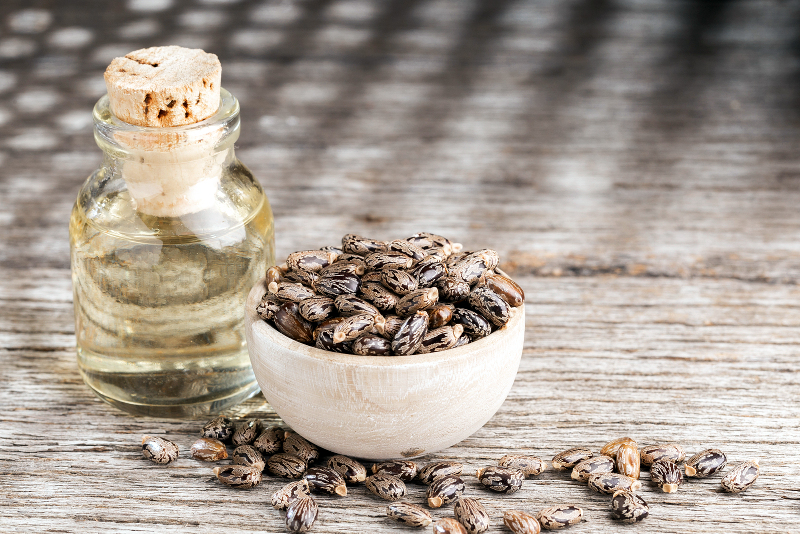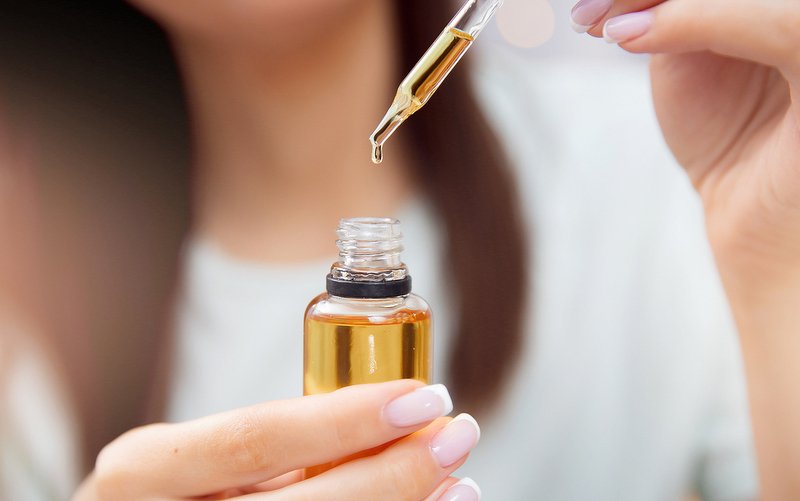Castor oil is great for so many things: treating constipation, moisturizing skin, and making hair softer — just to name a few. If you suffer from itchy and irritated skin, you’ve probably thought about using castor oil. Skin rash and irritation can often be relieved by castor oil, but it can sometimes be made worse.
When used properly, castor oil usually helps skin and can relieve symptoms of itchiness and rashes. However, everyone is different, and people with sensitive skin may have a bad reaction to castor oil. In these cases, the oil may actually cause a rash rather than get rid of one.
To help you decide whether to use castor oil on your rash or itchy skin, below I cover the benefits of castor oil for skin, whether putting it on a rash or itchy skin is a good idea and whether castor oil can cause skin rashes.
What Is Castor Oil?
Castor oil is a type of vegetable oil that is derived from the castor bean plant. It naturally grows in warm, tropical regions of Africa. The oil has been used for centuries to treat minor ailments. Today, you can find the ingredient in many skin care products, medication, and cosmetics.
To learn more about castor oil, check out my article here.

Benefits Of Castor Oil For Skin
Castor oil truly has some great properties to help with your skin. No matter what skin issues you have, castor oil can help with almost anything.
It Moisturizes Skin
Castor oil is very good at locking in moisture and hydrating skin. The oil is made up mostly of ricinoleic acid, a fatty acid with anti-inflammatory properties. People who suffer from dry skin often have skin that is also inflamed, and castor oil can decrease those symptoms.
In the winter, people tend to deal with excessively dry hands and feet. Using a castor oil moisturizer on your hands and feet overnight can greatly increase the softness and health of your skin. To really hold in the moisture overnight, try wearing a pair of gloves and socks after applying the castor oil.
It Can Eliminate Dandruff & Rehydrate Hair
Dandruff is a severe type of dry skin, so it makes sense that castor oil can help eliminate dandruff. You can use a castor oil mask to help heal your itchy, inflamed, dandruff-ridden scalp.
Massaging a castor oil mix into your hair not only reduces inflammation, but it also increases circulation in your scalp. When your circulation is improved, more blood will flow to your scalp. With more blood in your scalp, your skin and hair follicles are receiving more nutrients and becoming healthier.
It Treats Acne
Castor oil is a wonderful product to use for the treatment of acne. Whether your skin is dry or oily, castor oil can help.
Many people with oily skin experience acne because — well — there is excess oil clogging their pores. It might seem counterproductive to use oil on oily skin, but it actually works really well! Castor oil will draw in the harmful oils, and when you wash away the castor oil, you also wash away the harmful oils.
Despite what many people might think, people with dry skin often suffer from acne as much as those with oily skin. When your skin is dry, it overcompensates by creating an excess of an oily substance called “sebum”. The sebum clogs your pores and causes acne.
Castor oil is not comedogenic, meaning it does not clog pores. It also has anti-inflammatory, antibacterial, and anti-fungal properties. Acne is formed from the pores becoming filled with bacteria, so these properties are very useful.
How To Use Castor Oil For Skin
There are a couple of options for using castor oil. You can place it directly on the skin, diluted with a carrier oil like almond oil or coconut oil. It’s important that you always use a carrier oil. Using pure castor oil is just as likely to cause skin irritation as it is to help it.
You can also use a castor oil pack which may be more effective for more severe skin problems. Packs are made from a piece of cotton or wool. You will want to fold the fabric into three or four layers.
You will then saturate the fabric in castor oil and place the pack on the effected area. Hold it there with a wet water bottle for about one hour.
After finishing with the pack, cleanse the irritated area with a quart of warm water mixed with two teaspoons of baking soda. Because you are holding the pack directly against your skin, it is more likely to have an effect on your irritated skin than simply using castor oil as a moisturizer.
Is Castor Oil For Skin Rash Or Skin Irritation A Good Idea?
Castor oil has wonderful moisturizing and healing properties, so it is excellent to use for skin irritation.
Most people develop rashes due to dermatitis — inflammation of the skin that may result from an allergic reaction to chemicals, poison ivy, dyes, food, or other irritations. Still, you can use castor oil for heat rash and other rashes as well. Using castor oil on rash can often be very helpful in eliminating irritation.
Can you use castor oil for rash on face? Absolutely! Castor oil is very safe to use for your face — in fact, many people use it as a cleanser. Just be sure to keep it away from your eyes as it can be harmful.
People with sensitive skin are also prone to rashes, as well as people with skin conditions like eczema and psoriasis. It can even be a side effect of some medications.

Should You Use Castor Oil For Itching?
Castor oil is great for helping rashes, irritation, and itching of the skin. The oil is made up of about 90% ricinoleic acid which is a fatty acid with anti-inflammatory properties.
Dry skin often develops inflammation which contributes to rashes, irritation, and itchiness. Castor oil is great for locking in moisture to get rid of these awful symptoms.
Can Castor Oil Cause A Skin Rash?
Castor oil is generally good for everyone whether you have dry, normal, or oily skin. However, every body is different, so people may have varying reactions to castor oil.
Skin Sensitivities
Some people may have a sensitivity to it and notice increased irritation with castor oil. For example, those that suffer from eczema should not use castor oil because it can make your condition worse.
Those that are sensitive to castor oil are likely to experience red, bumpy rashes along with hives and itching.
If you notice that you are having a bad reaction to castor oil, immediately wash your skin with water and a mild, ideally unscented, soap.
It is important that you test a small amount of skin before applying pure or diluted castor oil to your whole body. Put the product on a small spot of skin, such as on your arm, and wait at least an hour to see if you have a reaction. Clearly, if your body reacts badly, you should wash it off immediately and discontinue use.
Dilute Castor Oil
It is also a good idea to always dilute the castor oil with another carrier oil. Carrier oils include products like olive oil, coconut oil, almond oil, or jojoba oil, among others.
Pure castor oil is much more likely to irritate your skin than diluted castor oil. It is recommended to always use a diluted form whether you are using it on your skin or in your hair. You may even put a few drops into an existing beauty product like shampoo or lotion and it will work just as well.
Castor Oil’s Absorbing Properties
If you’re using a beauty product that contains castor oil, make sure that you’re aware of what other ingredients are in the product.
Castor oil has great absorbing properties, so it will cause your body to absorb the other ingredients quicker as well. This is great if the product is full of good ingredients, but it’s not good if the product contains harmful chemicals or an allergen.
Conclusion
Castor oil is an awesome product that can have a lot of great effects on your body. However, just like with every product, you need to know how to use it. If you use it improperly, or if you have skin sensitivities, it is possible that castor oil will cause you increased irritation and possible rashes.
Still, if you dilute the oil, you will usually find that the benefits outweigh any possible side effects. Just always be sure to test a small patch of your skin to be sure.
Read our full guide to using castor oil on dry skin here, castor oil on your face here or whether castor oil is comedogenic here. You can also find all our guides to castor oil here.


Comments are closed.